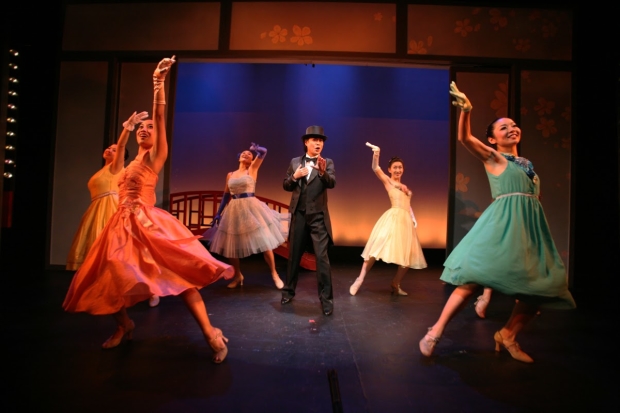
(© Quincy Lee)
September 2 of this year will mark the 70th anniversary of the surrender of Japan to Allied forces, officially ending World War II. Pan Asian Repertory Theatre takes this opportunity to revisit the decade following the war (and the thousands of Japanese-American families that were formed in that time) with a production of Sayonara. With music by George Fischoff, lyrics by Hy Gilbert, and a book by William Luce (The Belle of Amherst), Sayonara is rarely produced. Despite a competent production by Pan Asian Rep, it's easy to see why.
Sayonara is based on the 1954 James A. Michener novel that was later turned into a film starring Marlon Brando. Michener was also the author of Tales From the South Pacific, the basis for Rodgers and Hammerstein's South Pacific. Luce, Gilbert, and Fischoff were undoubtedly aiming to repeat the magic of that Broadway megahit: the themes, conflicts, and even the music are strikingly similar. Sadly, Sayonara never reaches the transfixing heights of South Pacific, which might explain why it didn't make it to Broadway following its 1987 world premiere at the Paper Mill Playhouse. Despite all its warm harmonies and star-crossed love, something about Sayonara feels stilted, holding us at a distance rather than pulling us into its bittersweet romance.
The story takes place during the Korean War. Ace Gruver (Morgan McCann) is the top pilot in the U.S. Air Force. The son of a four-star general and romantic interest of another general's daughter, Eileen Webster (Jennifer Piacenti), Ace has everything going for him, including a potential future career in Washington. He's disappointed when he's rotated to Japan, but his buddy Private Joe Kelly (Edward Tolve, with a winning puppy-dog enthusiasm) isn't. Joe is set to marry his girlfriend, Katsumi (Natsuko Hirano), but since the military doesn't recognize marriages between American soldiers and Japanese women, there's no way Joe will be able to return Stateside with his new wife. Ace thinks Joe is a fool, until he finds himself falling for a Japanese girl too: the stunning lead dancer of the Takarazuka Theater, Hana-Ogi (Ya Han Chang).
Luce wisely centered his book on the Takarazuka, an all-female theater troupe that produces lavish Broadway-style musicals. A program note claims no relation to the eponymous revue (owned and operated for over a century by the Hankyu Railway Company), but honestly, Takarazuka is too ideal a setting for a big American musical to pass up. Choreographer Rumi Oyama (who also charmingly plays the actress Fumiko) has taken full advantage of Takarazuka with her dazzlingly energetic dance sequences, flawlessly executed by the ensemble.
Dance numbers aside, Fischoff's music is dreamy and complex, if a bit unmemorable. Would that Gilbert's tin-eared lyrics were equally unmemorable. Sadly, it will be hard to forget the awkwardness of moment Hana-Ogi is forced to sing, "I am girl of Nippon / And my skin is yellow as the sun / Always girl of Nippon / For my heart, my country, are as one." Such well-meaning gestures toward Japanese nationalism (through a very Western lens) would have sounded ham-fisted to many audience members even in 1987.
Despite the bumbling lyrics and book, director Tisa Chang's production excels at exposing the ugly prejudices that flourished during and after the American occupation of Japan. Sandy York plays Eileen's mother Miriam with a subtle brutality. Her every line ("Our American boys are being tricked into marriage by these Japanese girls!") is likely to make you wince. Even more overtly cruel is the gestapo-like Colonel Craford, who is portrayed with sadistic glee by Justin R.G. Holcomb. You might want to stand up and cheer when he finally gets punched in the face.
Unfortunately, Chang's staging of the love story at the heart of the play won't raise nearly as much emotion. It's about as arthritic as Sheryl Liu's set of moving Japanese screens. As the crew strains to transition the set upstage, the actors struggle to forward the plot and develop their characters' relationship downstage.
In fairness, this may be inherent in the show. The most touching storyline ends up belonging to B-plot Joe and Katsumi. It's darkly ironic that the most functional couple onstage ends up meeting the most tragic end. Tolve and Hirano have a real chemistry that makes you wish you were invited over for sake at their little house by the canal. Conversely, Ace and Hana-Ogi seem like a bad match from the beginning. Both are too married to their careers to ever engage in a serious relationship. One could chalk up their romance to the exuberance that accompanies infatuation, if there were any such exuberance on display. Sadly, there's nary a spark between McCann and Chang. Some of this has to do with standoffish performances, but mostly it's because there's no fire in Luce's stilted script.
All things considered, the Pan Asian Rep has produced a solid staging of a mediocre musical. We should all look forward to seeing their talents applied to better work in the future.









